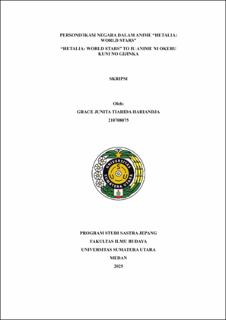| dc.description.abstract | This study discusses the personification of nations in Hetalia: World Stars anime. The personification of nations illustrates national identity by portraying countries as living individuals who possess specific traits and behaviors like humans. This approach is used to make it easier for viewers to understand the concept of national identity through each character. The purpose of this study is to identify the meaning of national personification and to understand the relationships between nations as depicted in Hetalia: World Stars anime, using a literary perspective. The data in this research consist of dialogues, behaviors, and interactions between characters taken from the anime. The method used is descriptive qualitative, with data collection techniques including documentation and observation, which were then analyzed contextually. The results show that the personification of nations in Hetalia: World Stars anime represents the distinctive characteristics of each country, such as Italy’s relaxed nature, Germany’s discipline, Hungary’s empathy, Prussia’s confidence, Austria’s orderliness, France’s sarcasm, America’s arrogance, Slovakia’s consistency, England’s visionary outlook, Russia’s manipulative nature, until Japan’s politeness. The relationships between nations reflect dynamics of cooperation, cultural value conflicts, and political tensions between countries. | en_US |


